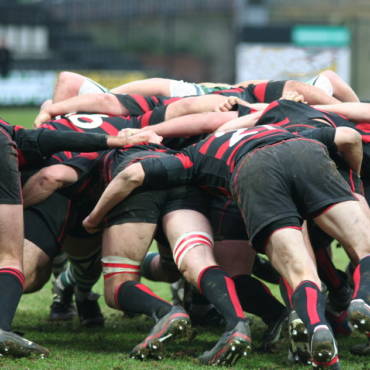There have been many attempts to define and measure mental toughness in coaching textbooks, academic literature and even in the popular media.
Words like “persistence”, “perseverance”, “determination”, “commitment”, “resilience” and “uncompromising” seem to be used to describe mental toughness: something which clearly means different things to different people.
For some people, mental toughness is about being able to maintain composure, calm and control in difficult situations.
For others, mental toughness is related to physical “hardness” and the ability to endure pain, fatigue and stress in competition conditions and still prevail.
I like this definition of mental toughness – which is something I’ve developed over many years of working with coaches and athletes across a wide range of sports all over the world:
Mental toughness is the capacity of an athlete to do their “job” – i.e. to do the thing/s they’ve trained to do no matter what’s happening to them or around them.
There has been a lot of work from the academic sector to attempt to define and measure mental toughness, with most of the recent literature discussing mental toughness in terms of “situations” and that mental toughness is a complex set of different attributes expressed differently by people in different situations.
Coaches all agree however, that for competitive athletes, mental toughness is a highly desirable athletic quality: one which is as prized as outstanding physical abilities, excellence in skills and technical knowledge.
But how can you coach an athlete to be mentally tough?
Mental Toughness: Two Basic Coaching Approaches
There are two basic approaches to coaching mental toughness:
- Toughen the body to toughen the mind and
- Toughen the mind to toughen the body.
“All of us get knocked down, but it’s resiliency that really matters. All of us do well when things are going well, but the thing that distinguishes athletes is the ability to do well in times of great stress, urgency and pressure.”
Roger Staubach
Mental Toughness Coaching Approach 1: Toughen the body to toughen the mind
This has been the most commonly used approach by coaches to try and develop mental toughness in their athletes. The essence of this approach is hard work, i.e. the harder I work, the tougher I get.
The core philosophy behind this approach is: “Make training more challenging and more demanding, physically and mentally, than the competition you are preparing for”.
This approach has several good things going for it and it is relatively simple to do. Through this approach, athletes develop confidence in their ability to meet the physical demands of the competition environment and in their ability to deal with whatever is “thrown” at them during competition because they know ( i.e. confidence comes from knowing) that their preparation has been better in every detail than that of their opposition.
Many, many football competitions, world championships and Olympic Gold medals have been won by coaches and athletes adopting the toughen the body to toughen the mind approach.
However, for some athletes this approach can be too confronting, too demanding and ultimately can actually cause athletes to become de-motivated and even intimated by the training environment. Some athletes will fall to the stress and strain of the intense physical loads required by this approach and break down through over-training.
A big mistake however that coaches make is to assume that athletes who fail to respond to this approach are “soft” and therefore unable to compete successfully. The fact is that all athletes (people) are different. Some respond incredibly well to endurance training…some don’t. Some respond positively to strength training…some don’t. Some respond strongly to the toughen the body to toughen the mind approach…some don’t.
Mental Toughness Coaching Approach 2: Toughen the mind to toughen the body
The second approach to Coaching Mental Toughness is the toughen the mind to toughen the body approach. Coaches who adopt this approach focus on developing the athlete’s mental skills and teaching them the psychological techniques to thrive in the competitive environment.
There are many excellent mental skills techniques which can enhance an athlete’s ability to perform to their full potential under the pressure of competition including Sports Mindfulness which among other things teaches athletes to live in the moment and to not overly think about the past (e.g. mistakes which may have just been made) or the future (e.g. the pressure of the situation and the need to score points).
An athlete who masters a technique like Sports Mindfulness can be, by any definition, mentally tough, as they have the ability to perform to their full potential regardless of the situation.
So which approach is the right approach to help athletes develop Mental Toughness?
The right approach is:
a. The one which suits your own personal coaching philosophy and
b. The one which works with the individual athlete you are a coaching.
There is no one size fits all coaching method to enhance mental toughness. Some athletes respond well to Mental Toughness Coaching Approach 1. They thrive on hard work. They love being physically challenged. They grow and mature as athletes through an uncompromising commitment to training as hard as possible. And some athletes do not respond this approach. Others respond far better by learning to master their mind and to tap into the almost unlimited potential that lives between their ears!
“Win or lose you will never regret working hard, making sacrifices, being disciplined or focusing too much. Success is measured by what we have done to prepare for competition.”
John Smith
And the biggest question of all….can you turn a “soft” athlete into a “hard” athlete through great coaching?
The short answer is Yes.
A “soft” athlete is one who lacks the mental abilities to compete to their full potential – particularly when things get difficult, challenging or unpredictable. Coaches, believing they can identify “soft” athletes then embark on a training program to help the athlete develop the skills and abilities to better manage competitive situations and therein become “hard”, i.e. tough, resilient etc.
Some athletes are naturally hard: and by naturally, I mean they have learnt to be hard through necessity, overcoming adversity and set backs in their lives both inside and outside of sport. They then carry this “hardness” into their preparation and performance, i.e. “the way you do anything, is the way you do everything”.
For others, “hardness” (mental toughness) is a skill and like any skill it can be learnt, practiced, enhanced and mastered. In the same way you would not teach an athlete complex, difficult, advanced sporting skills and techniques in their first year of training, mental toughness is not something that athletes learn from a single lecture, sporting autobiography or audio recording. Mental toughness needs to be introduced, nurtured, developed and enhanced and systematically measured in both training and in competition situations over an athlete’s career just as any other sporting skill or technique.
“I’ve never known anybody to achieve anything without overcoming adversity.”
Lou Holtz
Summary
- Mental toughness is a much talked about, much investigated aspect of sports performance yet surprisingly, while many people believe they know what it is, where it is and how to find it, very little is understood about coaching it.
- Whether you adopt the “body to mind” approach or the “mind to body” approach, coaching mental toughness is about understanding your athlete and what they need to enhance their mental abilities to thrive in competitive situations.
- There are times when both approaches can be used effectively in the preparation of athletes. Coaching is an art form: and an important part of the art is knowing what to do, when and how.
“It may sound strange, but many champions are made champions by setbacks.”
Bob Richards
Wayne Goldsmith



